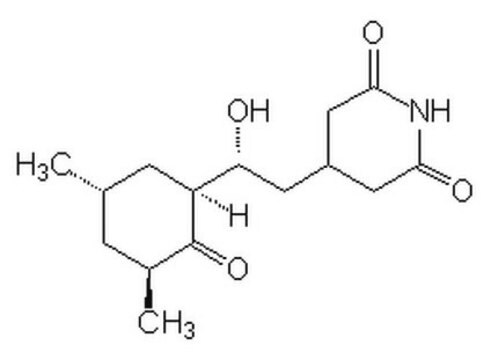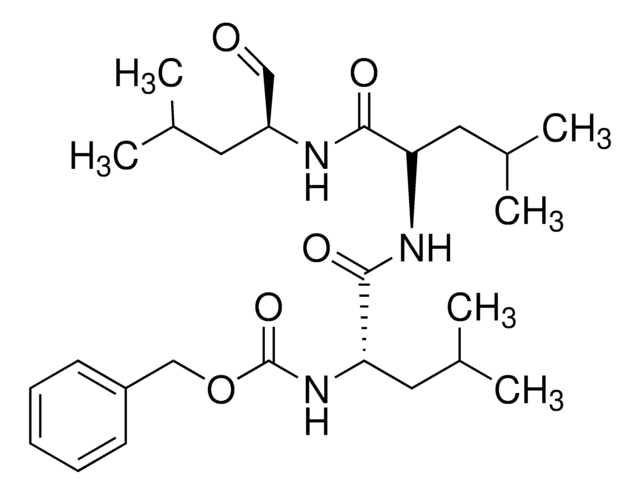01810
Cycloheximide
≥90% (HPLC)
Sinónimos:
3-[2-(3,5-Dimethyl-2-oxocyclohexyl)-2-hydroxyethyl]glutarimide, Actidione, Naramycin A
About This Item
Productos recomendados
origen biológico
microbial
Nivel de calidad
Análisis
≥90% (HPLC)
formulario
powder or crystals
color
white to light beige
espectro de actividad antibiótica
fungi
yeast
Modo de acción
protein synthesis | interferes
InChI
1S/C15H23NO4/c1-8-3-9(2)15(20)11(4-8)12(17)5-10-6-13(18)16-14(19)7-10/h8-12,17H,3-7H2,1-2H3,(H,16,18,19)/t8-,9-,11-,12+/m0/s1
Clave InChI
YPHMISFOHDHNIV-FSZOTQKASA-N
Información sobre el gen
human ... FKBP1A(2280) , PIN1(5300)
Categorías relacionadas
Aplicación
Acciones bioquímicas o fisiológicas
Envase
Otras notas
Palabra de señalización
Danger
Frases de peligro
Consejos de prudencia
Clasificaciones de peligro
Acute Tox. 2 Oral - Aquatic Chronic 2 - Muta. 2 - Repr. 1B
Código de clase de almacenamiento
6.1A - Combustible acute toxic Cat. 1 and 2 / very toxic hazardous materials
Clase de riesgo para el agua (WGK)
WGK 3
Punto de inflamabilidad (°F)
Not applicable
Punto de inflamabilidad (°C)
Not applicable
Equipo de protección personal
Eyeshields, Faceshields, Gloves, type P3 (EN 143) respirator cartridges
Certificados de análisis (COA)
Busque Certificados de análisis (COA) introduciendo el número de lote del producto. Los números de lote se encuentran en la etiqueta del producto después de las palabras «Lot» o «Batch»
¿Ya tiene este producto?
Encuentre la documentación para los productos que ha comprado recientemente en la Biblioteca de documentos.
Los clientes también vieron
Nuestro equipo de científicos tiene experiencia en todas las áreas de investigación: Ciencias de la vida, Ciencia de los materiales, Síntesis química, Cromatografía, Analítica y muchas otras.
Póngase en contacto con el Servicio técnico








